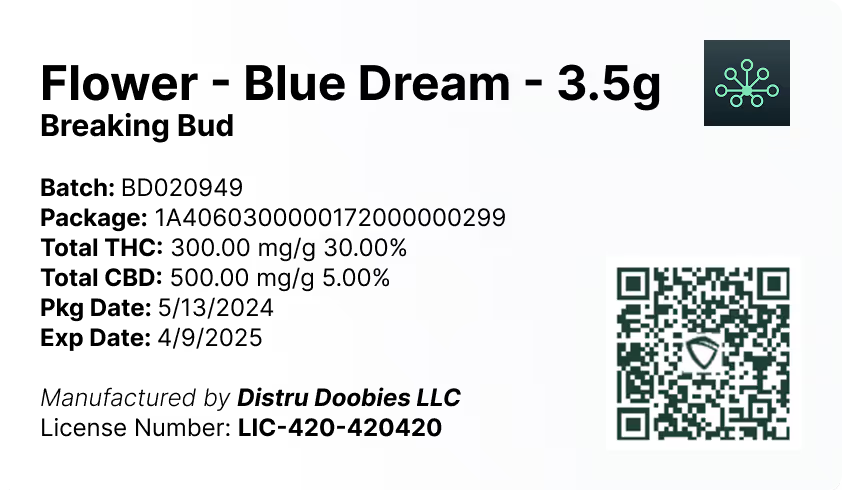The cannabis extraction market is truly building momentum. According to Research Nester, it was valued at $5.13 billion and $5.99 billion in 2024 and 2025, respectively, and it's also expected to grow at over 19.7% CAGR, potentially exceeding $53.13 billion in size by 2037.
Such significant growth was spurred by the increasing legalization of cannabis across the world, which has reduced the stigma associated with marijuana use and boosted demand for high-quality products, from cartridges to edibles.
Among the most popular cannabis goods are concentrates, which offer a diverse range of consumption methods and are employed as ingredients to create other products. In order to manufacture them, processors use specialized tools like closed-loop extraction systems–known for providing a solution to many challenges associated with traditional extraction techniques.

The move towards the use of such sophisticated equipment responds to a need for enhanced safety, efficient solvent recapture, and streamlined production of high-purity extracts. Do you want to learn more? In this blog post, we'll dive into what a closed-loop extraction system is, the benefits it offers to cannabis operators, and more. Read on!
What Is a Closed-Loop Extraction System, and How Does It Work?
To understand why this specific tool is gaining traction in the cannabis industry, we need to define it and learn how it works first. So, what is a closed-loop extraction system?
A closed-loop extraction system is a specialized piece of equipment used to extract valuable compounds, such as cannabinoids and terpenes, from cannabis plant material, specifically during solvent-based processes.
.png)
The term "closed-loop" refers to its design, which has made it a highly popular option among cannabis processors. For many years, people used open blasting systems to produce extracts, but they're open to the environment, posing significant risks of damage and explosions.
Contrastingly, a closed-loop extraction system keeps the solvent sealed throughout the process and prevents potentially dangerous substances from coming into contact with the outside air, mitigating hazards.
Besides being safer, these machines can boost efficiency in production and are designed to recover solvents in their gas form in order to condense them back into liquids for reuse, minimizing operating costs and reducing waste.
Key Components and Types
Closed-loop extraction systems come in various sizes, and some are designed to work with specific solvents, so they're categorized into these different types:
- Small closed-loop extraction systems: As the name suggests, a small closed-loop extraction system is ideal for smaller-scale operations, such as cannabis-related research and development or craft extraction businesses. This is due to the fact that they can only process a few pounds of plant material per cycle. An example of this type is the 45G Mini Top Fill, which has a 45-gram capacity and can handle smaller batches, such as those for personal runs and tests.
- Industrial closed-loop extraction systems: This type, on the other hand, can process hundreds of pounds of plant material per run, so it may be suitable for large-scale commercial operations. An industrial closed-loop extraction system is typically equipped with automated controls, has a more robust construction, and offers higher flow rates for continuous operation.
- Closed-loop BHO extractors: A closed-loop extraction system for BHO is designed to perform Butane Hash Oil extraction. Operating at lower pressure and maintaining a low temperature (-40°F), these machines use butane in its liquid form as the solvent to extract full-spectrum cannabinoids and terpenes.
- Closed-loop CO2 extractors: Created for CO2 extraction, these systems use carbon dioxide in both subcritical and supercritical states and under well-controlled conditions to extract cannabinoids and terpenes, allowing you to isolate specific compounds of your choice to produce concentrates for different purposes.
- Closed-loop ethanol extractor: This type of closed-loop extraction system uses ethanol as a solvent, which is considered food-grade and safer than highly volatile hydrocarbons like butane, passing this substance through the plant material to dissolve and extract cannabinoids and terpenes.

Although there are many types, and each is designed for different needs, most closed-loop systems have the following components in common:
- Solvent tank: Usually made of stainless steel, it's a chamber that holds the solvent before and after the extraction process.
- Material column: This is the container where the plant material is placed. The system moves the solvent through this chamber to extract the desired compounds.
- Vacuum pump: This component ensures the solvent flows better through the closed-loop extraction system and aids in the separation, purification, and recovery stages.
- Collection tank: This is where the solvent, now carrying the extracted compounds, is collected after the extraction process.
- Recovery tank: Composed of a heater, a compressor, and an array of vacuum pumps, it's a complex, specialized assembly that recovers and condenses the solvent, returning it to the tank where it can be used again.
The Extraction Process
Everything we've learned leads us to another important question: How does a closed-loop extraction system work?
As explained above, the ability to ensure solvents never touch the air is what makes a closed-loop extraction system safe, but do you remember that we mentioned it's also efficient? It comes down to the fact that it works through specific, carefully designed steps.
.png)
Here's a look at the closed-loop extraction process split into its main stages:
- Preparation: The plant material is prepared (typically ground) to allow the solvent to penetrate the cannabis better and optimally extract compounds.
- Loading: The prepared material is loaded into its respective column.
- Solvent injection: The solvent is introduced into the material column from a pressurized tank.
- Extraction: The solvent passes through the chamber where the cannabis is placed, dissolving the desired compounds as it penetrates the plant material.
- Separation and purification: The solvent and the extracted compounds go to the collection tank. Depending on the system, this mixture may then be moved to a different chamber for further separation and purification, which often involves using heat and vacuum pressure. It's important to keep in mind that the type of filtration needed always depends on the solvent's characteristics.
- Solvent recovery: In the closed-loop extraction process, the used solvent isn't discarded but is collected again and condensed for recycling.
- Purging: Extracts are purged to remove any solvent residues.
- Final product collection: Once separated, purified, and purged, extracts can be either packaged or undergo further processing, such as winterization or distillation.
To summarize, the closed-loop extraction process focuses on circulating a solvent through the plant material to dissolve the desired compounds, and then recovering the solvent for reuse. These systems' design and operational capabilities ensure that the chemicals remain in a controlled environment from start to finish, not only improving safety but also enhancing the quality and consistency of the final extract.
.png)
Benefits and Safety Advantages of Closed-Loop Extraction
You already know what it is and how it works, but what are the benefits of using a closed-loop extraction system? Let's go over the main advantages that this piece of equipment offers to cannabis businesses:
Safety Advantages
Closed-loop extraction safety is among the main reasons why these systems are becoming so popular in the cannabis industry.
Compared to open-blast methods, which expose flammable chemicals to the open air, closed-loop extractors keep the solvent isolated in a controlled environment throughout the entire process, reducing the risk of exposure, fire, and explosion.
In addition, they're usually equipped with specialized components that enhance safety. Have you ever wondered, "What safety features should I look for in a closed-loop extraction system?" These tools usually have pressure gauges, ventilation interlocks, emergency relief valves, and stop buttons, which ensure they operate under safe conditions and help prevent dangerous situations.
If you purchase your equipment from reputable closed-loop extraction system manufacturers, you can also be sure it'll comply with strict safety regulations. This can be another advantage for your business when obtaining permits and certifications.

Extract Quality and Efficiency
Closed-loop systems also excel in producing high-quality extracts with greater efficiency. Since the entire extraction process occurs in a sealed environment, you have precise control over determining factors, such as temperature, pressure, and flow rate, which results in extracts with higher purity and helps maintain consistency in production.
By operating in a sealed, controlled environment, these systems also reduce the risk of contaminants compromising the product during extraction and better preserve essential compounds like cannabinoids and terpenes. The result is an extract with higher quality and potency.
Additionally, professional closed-loop extraction systems can recover over 90% of the solvent for reuse, which reduces operating costs and maximizes savings over time while minimizing the process's environmental impact.

The ability to produce high-quality, potent, and consistent extracts at higher yields can make your business's offerings more attractive and lead to better profit margins. This also directly impacts the Return on Investment (ROI), turning a closed-loop extraction system into a worthwhile expenditure for many cannabis processors.
Choosing the Right Closed-Loop Extraction System
Now that you know the essentials of a closed-loop extraction system and the benefits it can offer your cannabis business, are you ready to choose the right one?
Although it may provide a strong ROI over time, investing in this tool is such an important decision that can impact your productivity, efficiency, profitability, and product quality, so you have to consider several factors to make the best possible choice, including the ones discussed below.

Price Range and Factors Affecting Cost
Do you know how much money you should invest in your equipment? This information can help you set a realistic budget, so you only focus on viable options and don't waste time looking at models that are financially out of your reach.
So, what is the price range for closed-loop extraction systems? This can vary widely depending on the following factors:
- Size and capacity: Smaller systems designed for personal or small-scale use are typically cheaper, with some options costing even less than $5,000. In contrast, industrial-scale equipment built to process large volumes of material can cost over $100,000 or even $500,000.
- Materials: The better the materials used for its construction, the higher the closed-loop extraction system's price can be. High-grade stainless steel, for example, offers superior corrosion resistance and durability, which is crucial for safety and longevity. This makes it more expensive upfront.
- Automation: Closed-loop systems equipped with automated features, such as controls, sensors, and data logging tools, tend to be more efficient and accurate, so they generally require a bigger investment.
- Certifications: The best closed-loop extraction system will come with a certification that provides assurance of safety and quality. Certified models may cost more due to the additional testing and compliance requirements they're subject to.
- Features: Additional features that go beyond the basics, such as advanced filtration, temperature control, and specialized pumps, can also impact a closed-loop extraction system's price. The more tools it has, the more expensive it can be.
.png)
Top Manufacturers and Popular Models
There are many closed-loop extraction system manufacturers, and each of them offers varied options for different needs. It's important that you choose a reliable one to make sure your equipment is high-quality, so let's get to know the leading companies in this sector.
- Xtractor Depot: This company is known for providing processing supplies and equipment, including small- and large-scale closed-loop extraction systems, which are popular for their robust construction and reliability.
- USA Lab: Focusing on quality, this is another provider that offers closed-loop systems and other types of extraction equipment.
- Affordable Distillery Equipment: This supplier provides functional and durable distilling equipment for different applications, including closed-loop extractors, at competitive prices.
When looking for a closed-loop extraction system, you have to consider key factors, such as your budget and production volume, in order to make the right choice. Xtractor Depot, for example, offers the Titan X series, which has a workflow-focused design and can process large quantities of biomass. It can be a great option for large-scale operators.
If you run a startup or process small batches, compact kits may be more suitable. Many closed-loop extraction system manufacturers, including USA Lab and Affordable Distillery Equipment, sell models with smaller, more modular setups that work just fine for small-scale operations.
Getting Started with Closed-Loop Extraction
Do you want to invest in a closed-loop extraction system? This can be a smart move for your business, but keep in mind that it isn't just about purchasing the equipment.
From your facility requirements and training needs to the regulations you must comply with, there are other factors to consider besides the closed-loop extraction system's price. Below is more information.
Facility Requirements and Compliance
If you're involved in cannabis processing activities, including extraction, your facility needs to meet specific requirements to ensure safety and compliance, including the following:
- Space: Your facility must have sufficient space to accommodate your closed-loop extraction system. Additionally, there must be specific areas for solvent storage and post-processing.
- Ventilation: Although closed-loop systems prevent potentially hazardous chemicals from being released into the outside air during extraction, your facility still needs adequate ventilation to prevent the accumulation of solvent vapors.
- Power: Closed-loop systems require a significant amount of electrical power, so you need to ensure your facility has the necessary electrical infrastructure to handle that load.
- Safety equipment: Your facility must also be equipped with safety solutions, which include fire suppression systems, gas detectors, and personal protective equipment (PPE).
- Compliance: In most jurisdictions, cannabis extraction is subject to strict regulations. Therefore, you need to understand and comply with all applicable local, state, and federal laws governing this activity, from licensing requirements to building codes and safety standards.
.png)
Training and Best Practices
Training is another important aspect when operating extraction machinery. Both you and your employees should know how to use the required equipment for processing and be trained in proper operation, maintenance, and emergency protocols.
Every person directly involved in processing operations should be able to read a closed-loop extractor diagram and understand the basic principles of its setup, from the correct use of pressure and temperature controls to the equipment's behavior under different operating conditions.
Additionally, all operators must be proficient in all aspects of the closed-loop extraction process, including the essentials of cannabis extraction, solvent handling, and potential hazards.
To obtain the necessary skills to operate these systems safely and efficiently, you can consider the following resources:
- Equipment manufacturers: Where did you purchase your closed-loop extraction kit? Many manufacturers offer comprehensive training programs specific to their equipment. You can take their courses to learn how to install, troubleshoot, and maintain these systems.
- Specialized training providers: Some companies provide training to cannabis processors, specifically on topics regarding extraction, equipment use, and advanced techniques. With their support, you can develop a deep understanding of the science behind these systems, gain hands-on experience, and even obtain certification.
- Industry associations: Many organizations dedicated to the cannabis industry also have training and certification programs in place to teach operators about closed-loop extraction safety, best practices, hazard assessment, risk mitigation, and regulatory compliance.
Besides facilitating training, it's important that you develop and implement detailed Standard Operating Procedures (SOPs). This is part of the cannabis industry's best practices and can help ensure you manufacture high-quality extracts in safe conditions, offer safe products, and comply with all regulations applicable to the use of closed-loop systems.

Final Thoughts: Why Closed-Loop Extraction is the Way Forward
Closed-loop extraction systems have changed the cannabis industry for the better—bringing greater safety, efficiency, and reliability to extract production. And they'll continue to play an increasingly important role in the future as the sector continues to evolve, especially now that the demand for cannabis concentrates has grown.
As explained above, you'll find many options when looking for a closed-loop extraction system. All are designed to meet different needs and offer different benefits. However, you should understand how they work and consider essential aspects, including the products you expect to create and the solvent you plan to use, to make a smart decision, maximize your profitability, and ensure consistency in manufacturing high-quality, safe cannabis goods.
Do you want to level up your operations? In addition to upgrading your equipment with closed-loop systems, you can use cannabis manufacturing software like Distru. Our solution helps you streamline the extraction process and optimize the cannabis supply chain. Give it a try today!











